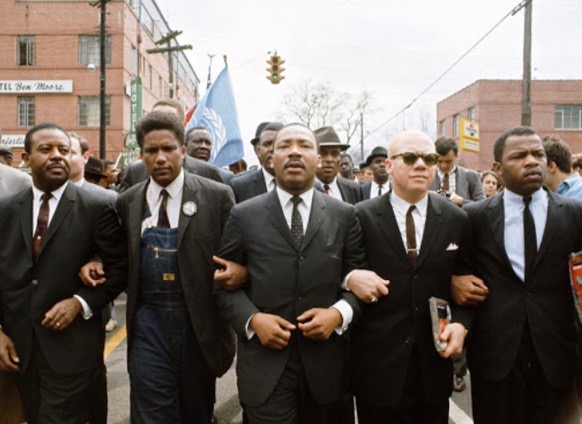A Voice to the Voiceless: Black History Month

The March on Selma, led by Dr. Martin Luther Kind Jr. is just one of the many important moments in black history
History is always told by the victors, and in American history that is usually the white men. However, every February our country promotes the unheard yet equally important history of the African American community with Black History Month.
Carter G. Woodson, whose parents were enslaved, is credited for starting this important movement. In 1926 when he recognized the whitewashing of history taking place in the American school system, Woodson proposed a week for students to learn about the astounding accomplishments of black people in America. In 1976, President Gerald Ford expanded this week into a full month, and this year marks the forty-fifth anniversary of Black History Month.
“[We must] seize the opportunity to honor the too-often neglected accomplishments of black Americans in every area of endeavor throughout our history,” President Ford said.
The purpose of this month for individuals is to learn more about black history and the important—and often unknown—figures who helped shape it. To help you start this journey, here is a list of a few of these remarkable people.
In addition to educating yourself on the remarkable people and stories that surround African American history, the NAACP released a list of ways for black people and their allies to celebrate, including:
Each year, the month is assigned a specific theme; this year is “Black Family: Representation, Identity and Diversity.” This focuses on the African Diaspora and the dispersal of black families across the nation.
With the recent protests and calls for racial justice that flared up last May, this Black History Month and its celebrations are on many people’s minds. It is impossible to change the past, but by learning about it and giving a voice to those who were voiceless, we can work together as a nation and as one people to build a better future.

Kalea Reeves is a senior at St. Dominic. When she’s not working at McAlister’s, she’s rewatching the Good Place for the seventh time. And no, she...



















Joe R • Mar 2, 2021 at 1:50 pm
Perfect! Talented writing. Great job reminding us that Black History is American History.
Grandma Bonnie • Feb 12, 2021 at 4:12 pm
Congratulations Princess on a well thought of and well written article on Black History. It showed that you did your research and reasoned within yourself in such a manner that you were able to convey your thoughts and perspectives to to us the reader. No matter where we are in our experiences with Black History, you touched a cord and a spark that propels us onward to greater and more amazing heights and dreams.
Keep souring like an eagle; there is a calmness and peace beyond the horizon that you can experience and report on on the future.
Job well done. Proud of you. Looking forward to more prize winning articles.
Janice Pottinger • Feb 11, 2021 at 5:43 pm
I was intrigued with the history lesson of how, when, and the span of time Black History Month got established. Didn’t realize it was President Gerald Ford who initiated the idea of extending the awareness and celebration of black achievements from a week to a month .Thanks for the history lesson. Your article is very well written. Keep up the good work. I am proud of you!
Janice Pottinger • Feb 11, 2021 at 11:17 am
Thank you for such an inspiring article. What stood out to me was the history of the beginnings of recognizing the acknowledgements of African Americans. Thank you so much for sharing your writing talent with us. I look forward to reading more of your material.
Cynthia Dickerson • Feb 10, 2021 at 2:03 pm
Starts off enlightening and captivating. The article is concise yet well-rounded making it a remarkable piece. There is a call to action that we all should consider.
Thank you Kalea Reeves
Annette Voege • Feb 9, 2021 at 8:41 am
This was a great piece, giving the reader an appropriate overview of black history month and not only the meaning behind it but the incredible importance of it as well. I’m sure pages and pages could be written but this was a great summary. I appreciate the specific actions that individuals can take to take part and have a voice in a meaningful way. Excellent work!
Trent Cook • Feb 9, 2021 at 4:31 am
Very well crafted article, and very insightful for a writer so youthful.
It is extremely important to know ones history, and from where we’ve come from. It is equally important to know where we’re going and how far we’ve come.
Keep up the good work Kalea Reeves!
Lenae Reeves • Feb 8, 2021 at 10:02 pm
What great perspective! I really appreciate the call to action. Learning about other cultures is great. Experiencing and supporting other cultures breeds empathy and allows us to appreciate the similarities and differences. Awesome article!
Felicia Reeves • Feb 8, 2021 at 10:00 pm
How thoughtful Kalea! Very proud of you!
Beth Reeves • Feb 8, 2021 at 8:46 pm
Great article !
Jeff Hutchings • Feb 8, 2021 at 4:16 pm
Kalea,
Great job carrying on the tradition of black history month by helping teach others about our history, black history. What a way to catch people’s attention with that opening line! Facts. Fantastic post! Thank you for sharing!
Jeff
Brandyn Reeves • Feb 8, 2021 at 3:58 pm
Awesome writing!
I agree with your opening statement about how history gets recorded, but it’s unfortunate because I wish we could reach a point where black history is taught within American history as opposed to alongside it. Although our history is messy and unpleasant, many lessons can be learned by ensuring we all know the full and truthful details about the events of slavery, segregation, and the years beyond.
Maurice Walton • Feb 8, 2021 at 3:45 pm
This is awesome!!! Very educational and very articulate. As a black man it warms my heart to see the youth of black America not only know where they come from, but also able to educate others. Keep going!!!
Jeff • Feb 8, 2021 at 3:26 pm
Thank you.